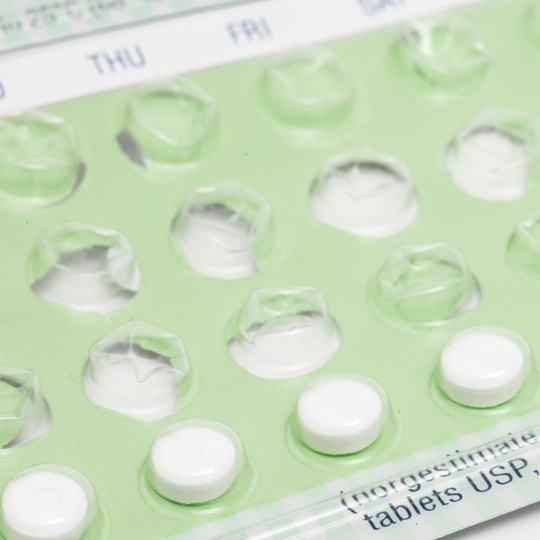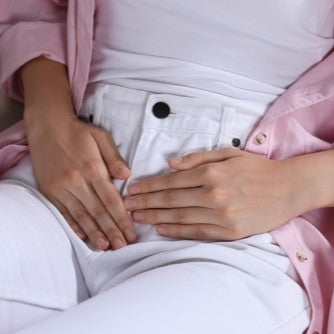When it comes to meds that do the most, we really have to take our hats off to the Pill. Just one daily pill has helped millions of women manage painful period symptoms, protect themselves from pregnancy, clear their skin, and so much more. All of those perks in an affordable, easy-to-take medication? It’s no wonder that 25 percent of all women in the U.S. aged 15-44 use oral contraceptive pills.
If you’ve ever been on the Pill, you probably got a short speech from your doctor about the potential side effects (because like all meds, there can be some side effects). Usually they’re inconvenient but temporary, like nausea, breast tenderness, or breakthrough bleeding that gets better after the body adjusts to the new levels of hormones. But some women find that they experience a different kind of side effect that wasn’t mentioned in the drug facts leaflet or by their doctor: vaginal dryness.
Why can the Pill cause vaginal dryness?
Combined oral contraceptive pills (also known as COCs) work by introducing extra estrogen and progesterone to your system. These hormones work to stop ovulation, thin the lining of your uterus, and thicken your cervical mucus in order to prevent pregnancy. The extra hormones can provide other benefits as well, like making your periods more regular and lighter, nixing period cramps, and improving hormonal acne.
However, some research has shown that this form of hormonal contraception might cause vaginal dryness in some women. This could feel like dryness, itching, burning, stinging, and even pain or bleeding down there—which can make sex painful and unpleasant.
This might be surprising to hear. After all, don’t people in menopause use hormones like estrogen to help with vaginal dryness? Why are they potentially causing dryness now? Experts are still working on understanding the why, but the likely culprit is that COCs can lower your body’s testosterone levels and increase the levels of another compound called sex hormone-binding globulin (SHBG).
Why does that matter? Well, testosterone helps keep vaginal tissue strong and thick, and also supports various processes that help with arousal and lubrication. With less testosterone in your body—and more of SHBG, which binds to sex hormones so they can’t be used—it may become harder for your vaginal tissues to make the lubrication they need. (In other words, that dry feeling!)
To be clear, not everyone will deal with vaginal dryness while on The Pill. But if you experience these symptoms, they unfortunately can persist the entire time you take a combined oral contraceptive—and even in some cases, last long after you stop taking the pill.
Okay, so what can I do about it?
We’re not out here trying to get you to break up with birth control, particularly when it does so many other helpful things in addition to preventing unwanted pregnancy. But vaginal dryness can be majorly uncomfortable and disruptive to your day-to-day life—and the last thing any of us wants is for people to just put up with pain when there are great solutions available.
- V Relief Serum ($39): Kindra’s special serum uses hydrating ingredients plus a clinically-backed peptide that will help reduce skin sensitivity to rehydrate your vaginal and vulvar tissues while cutting down on stinging, itching, and dryness.
- Soothe Bath Soak ($19): Take self care to the next level with our bath soak. It uses soothing chamomile and a powerful peptide to calm itchy, uncomfortable skin and ease vulvar and vaginal discomfort.
- High-quality lube: For in-the-moment relief, invest in a good water- or silicone-based lube, like V Lube ($22). Use them as needed before and during sex to help make everything smoother and more pleasurable for you and your partner. (Avoid oil-based products, which are not safe to use with condoms, or “warming” lubes, which could further irritate things down there.
- Vaginal moisturizers: These products, typically available OTC, are used a few times a week to help combat dryness in your vaginal and vulvar tissues.
- Switch to a different form of birth control. Research shows that vaginal dryness is largely a problem associated with the Pill (specifically, the kinds that have estrogen and progesterone in them). If you still want to take hormonal birth control, talk to your OB/GYN about other options you can try, like the hormonal IUD, the progesterone-only pill, the patch, ring, or shot.
Leave a Reply
Tags: birth control birth control pills contraceptives Hormones Self care taking care of yourself Trending vaginal dryness vaginal health













